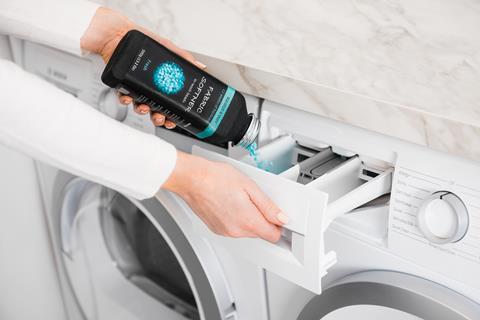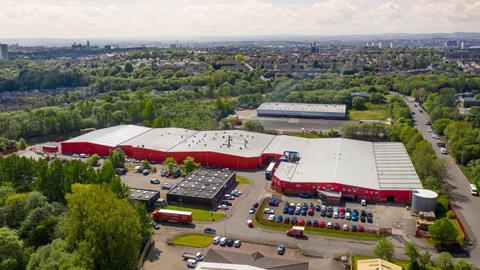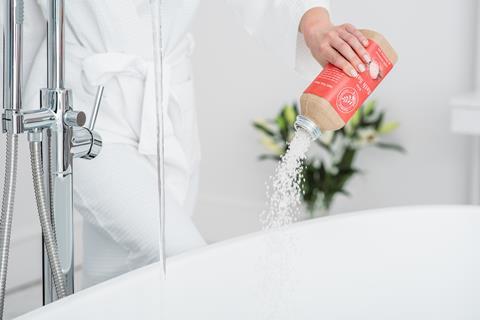
As part of our Finalist Interview series ahead of the Sustainability Awards, we spoke to Cullen about its Fibre Bottle, nominated in the commercialised Renewable Materials category.
You’re a finalist in the Sustainability Awards 2023. Congratulations! To start off, could you summarise your entry, in less than 50 words?
We created the patented Fibre Bottle as a sustainable packaging solution for dry goods to reduce single-use plastic waste, which is a serious environmental problem. We can manufacture 270 million units a year of the 100% plastic free, moulded fibre bottles, making it a viable real-word alternative to plastic equivalents.
Why do you think the judges were impressed with your entry? Tell us about what is innovative about your project and/or about its impact on packaging sustainability.
Plastic production is set to triple by 2040, with plastic packaging accounting for 40% of it and only 9% making its way into the recycling stream. The majority will end in landfill (6.1million tonnes a year). Also, the UK exports around 60% of the over 2.5 million tonnes of plastic packaging waste it creates.
As a result, sustainability is one of the biggest trends in packaging, and demand for innovative solutions at scale is growing rapidly. Consumers are demanding more sustainable packaging solutions, and regulatory pressure is increasing on businesses to hit their environmental goals. Thankfully our latest innovation, The Fibre Bottle, offers a major opportunity to switch to something radically better and at scale.
Cullen has been producing fibre bottles globally for the medical sector since 2009. We redesigned the bottle to create The Fibre Bottle, the world’s first scalable paper bottle alternative to plastic bottles and pouches for dry goods. Its versatility spans sectors including personal care, home care, pet care and horticulture. The Fibre Bottle is patented in its design and manufacturing process. Available in multiple sizes, shapes and colours, the bottle is crafted from the waste generated from our corrugated facility and it is completely plastic free, recyclable and compostable.
With the capacity to produce over 270 million bottles annually and this volume set to intensify with future infrastructure investments over the coming months, Cullen can remove significant volumes of plastic from the shelves today, most of which would otherwise end up in landfill after its single use.

How has your innovation/initiative been received?
The feedback is overwhelmingly positive and promising. Cullen have been inundated with enquiries and opportunities to work with FMCG powerhouses, as they have recognised that despite many claims that paper bottles exist, The Fibre Bottle from Cullen is the only real, manufactured at scale option available today. To make a real impact, sustainable packaging must also be cost effective and Cullen’s capacity to produce the volumes needed at a viable price point makes it a real solution for brands.
We also have agreements in place with these FMCG brands to further enhance the viability and performance of the bottle with advanced coating technologies. To ensure the coatings possess the necessary barrier protections for the various substances to be housed in The Fibre Bottle, we are concurrently developing multiple mixtures, exploring renewable materials to offer an alternative to bottles lined with fossil derived polymers or coatings that could contain toxic PER (Perfluoroalkyl) and Polyflourinated Substances (PFA’s).
You’re shortlisted for the Renewable Materials category. What do you see as the key demands and challenges in relation to developing new materials from renewable feedstocks for packaging applications?
There are many challenges on the manufacturing side, such as getting the right machinery and access to raw materials, as well as skilled staff. However, as manufacturers of corrugate and moulded fibre packaging, we’re uniquely placed to maximize the circular sustainability of materials used.
All the FSC-certified kraft paper off-cuts generated at our UK manufacturing site during the corrugate conversion process form the raw material to create our moulded fibre products. Our bespoke internal closed-loop recycling system captures the waste produced from the corrugate facility, giving it a second life. We build our own bespoke machines and tooling for all of our products, including of course the patented Fibre Bottle.

What do you think are the main opportunities in this area or what future innovations do you predict in this area?
Governments worldwide are aware of this and promoting greener packaging alternatives such as the UK’s recent Extended Producer Responsibility (EPR) scheme, which aims to stop the flow of hard-to-recycle plastics. The government might have delayed its rollout until October 2025, but the wait offers packaging buyers (distributors and retailers) an extra 12 months to adopt greener alternatives such as moulded fibre.
In doing so, brands will potentially cut the costs associated with EPR and close the gap to the 2035 target of recycling municipal waste and the 2050 target of eliminating avoidable waste. France have also made the landmark step of signing a decree to regulate the prohibition of plastic packaging for fresh, unprocessed fruits and vegetables after significant public consultation, as they aim to crack down on plastic pollution.
Whilst brands are on board with the introduction of The Fibre Bottle there is still work to be done with those in the supply chain, such as packaging distributors and filling suppliers. We’re working collaboratively with brands and the supply chain to support the switch from plastic to the Fibre Bottle. That’s not our traditional role, but it will support and speed up the transition to more sustainable packaging and our expertise in the packaging space is invaluable to our customers and their networks at this critical junction.
Whilst achieving 270 million sustainable alternatives to plastic bottles for dry goods is a major focus, our evolution into coating technologies and working with brands to define their requirements will further enhance the Fibre Bottle’s capabilities and propel its adoption even further across myriad of uses.
We’re well placed to support the transition from plastic to paper packaging. We have the capability, resources, infrastructure and most importantly the solutions. We can make that vision a reality.
The winners of the Sustainability Awards 2023 will be announced at the Sustainable Packaging Summit, which takes place in Amsterdam on 14-15 November. The Summit mobilizes leaders of the FMCG value chain, policymakers, NGOs, recyclers and investors to collaborate, remove barriers and identify opportunities on the road to sustainable transformation.
To learn more or register, visit https://www.packagingsummit.earth/amsterdam2023/.
If you liked this article, you might also enjoy:
The L’Oréal approach to packaging sustainability
What steps is Apple taking to make its packaging more sustainable?
How did Brazil achieve its 100% aluminium can recycling rate – and can it be replicated in the EU?
Experts have their say on the EU’s Packaging and Packaging Waste Directive revisions














No comments yet